
Recently on Cyclingnews.com |
63rd Vuelta a España - GT
Spain, August 30 - September 21, 2008
Contador aiming for Grand Tour treble
By Shane Stokes
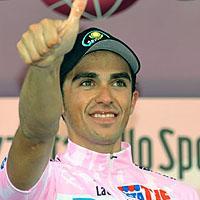 |
Alberto Contador has a chance to make history on home soil when he lines up in the Vuelta a España in Granada this Saturday. The 25 year-old Astana rider has already won the 2007 Tour de France and the 2008 Giro d'Italia and will equal Jacques Anquetil, Felice Gimondi, Eddy Merckx and Bernhard Hinault as winners of all three Grand Tours if he wears the jersey oro in Madrid in little over three weeks' time.
Should Contador pull off the feat, he would surpass the achievements of the other four riders as the fourteen months between his Tour 2007 victory and the end of the Vuelta would beat the Tour/Vuelta (1978) and Giro (1980) triple timeframe set by Hinault.
One factor which should help Contador in his task is the fact that he missed this year's Tour. The gap between Giro and Vuelta means that he should have greater reserves than his rivals who competed in the Tour de France; if so, expect him to remain strong in the third week while the other challengers begin to wilt.
Another thing in his favour is the strength of his team. Together with Levi Leipheimer and Andreas Klöden, both runners-up in the Tour de France, Astana has three options for the final victory. This means that the rivals have to keep tabs on all three, and also that there will be two super-domestiques at hand once a clear leader is established.
For now, Contador is the chief. "I would say that Alberto is definitely the number one captain on the team," Leipheimer told Cyclingnews on Monday. "He has won the Tour, he has won the Giro, and he has proved he is the best rider when it comes to stage races…especially the Grand Tours. I don't think you could argue with that. He is definitely in the pole position and, with Andreas and me there, it will be a strong challenge.
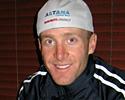
|
"I think the point-out is that we have six other very strong team-mates who can protect Alberto and who can also protect Andreas and me, and so the time trials and the mountains will sort it all out. If Alberto or even Andreas or I show that we are able to win the race, everybody will support that person. That said, I saw what Alberto did on the climbs yesterday [in the Clasica a los Puertos], so I fully expect him to be the best in the Vuelta."
Leipheimer is clearly also in form, given that he won the Spanish race. "It isn't a particularly big one, but it's always nice to win," he said. "And getting an Olympic medal [in the time trial] shows my condition is good."
When asked, the American saw one clear rival to the team, naming Carlos Sastre as one to watch. The Spaniard has been steadily improving each year, finishing as runner-up to Denis Menchov twelve months ago, and then this summer made the breakthrough when he finally won a Grand Tour. Prior to the Tour de France, few would have predicted that Sastre would top the podium; he was clearly a contender for a top three place, but in going the extra step and winning outright, he has moved on to a new level.
His chances in the Vuelta will depend very much on how he has recovered from the Tour. The demands of media and the natural temptation to ease back after a major victory are two factors which could have blunted his condition; however, if he's remained focussed, the psychological boost of winning the biggest race in the world may transform Sastre. The road ahead will tell how the CSC-Saxo Bank rider has responded.
Alejandro Valverde (Caisse d'Epargne) has a strong track record in the Vuelta, having finished second, third and fourth in previous editions. He's led the race, won four stages, but is yet to take his first Grand Tour victory. Solid rather than spectacular in the Tour de France, the weeks ahead will determine if he can progress to the top step of the podium.
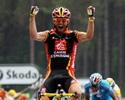
|
The race may also act as a Grand Tour reassurance for Damiano Cunego (Lampre), who had a disappointing Tour de France despite basing his season around hitting peak form for the race. His performances in the Vuelta will confirm if July was just a blip, or if he is no longer a contender for victories in three-week races. At 26, it is surely way too soon to write off the Italian climber.
A dark horse for overall victory is Igor Antón (Euskaltel Euskadi), who has been making steady progress in his career. He won a stage and placed fifteenth overall in 2006 and then finished eighth last year. This season, Antón was second overall in the Euskal Bizikleta this year and won a stage plus finished third overall in the Tour de Suisse.
Another rider who will be watched with interest is Robert Gesink (Rabobank). The 22 year-old is making his Grand Tour debut but, despite his young age and relative inexperience, has already shown exceptional promise. He has taken the best young rider's jersey for two years running in the Tour of California, also winning a stage and finishing ninth overall this year, and has also racked up a second place in the Tour of Poland, fifth in the Deutschland Tour, fourth in Flèche Wallonne and fourth in Paris-Nice. In the latter race he was second on the Ventoux stage this year, being beaten only by Cadel Evans after the Australian sat on him on the climb.
Stage hunters
There are of course many riders who are at the Vuelta to hunt for stage wins. Paolo Bettini (Quick Step), team-mate Tom Boonen, Oscar Freire (Rabobank), Stefan Schumacher (Gerolsteiner), Daniele Bennati and Filippo Pozzato (Liquigas), Danilo Napolitano and Alessandro Ballan (Lampre), Greg Van Avermaet (Silence Lotto), Erik Zabel (Milram), Mikhail Ignatiev (Tinkoff Credit Systems), Davide Rebellin (Gerolsteiner), Philippe Gilbert and Rémy di Gregorio (Française des Jeux), Sébastien Hinault (Crédit Agricole), Sylvain Chavanel and Nick Nuyens (Cofidis), Juan José Haedo and Alexandr Kolobnev (Team CSC) all have the potential to spray the champagne. Many of these are also in Spain to prepare for the Worlds, and so will be heading towards peak form as the Grand Tour progresses.
Route
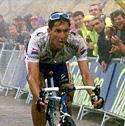
|
The 2008 Vuelta a España looks set to be fought out by climbers rather than time trial specialists, due to the nature of the route which was unveiled in Madrid last December.
It begins on Saturday August 30th with a seven-kilometre team time trial prologue in Granada, and concludes in Madrid 3173 kilometres later on September 21. The Grand Tour features eight mountain stages, amongst them a long-awaited return to the gruelling Angliru, one individual time trial of 40 kilometres and one hill-climb TT of 16 kilometres.
Unlike the Giro d'Italia, the climbers have little to fear in the races against the clock and will welcome a route which has been tailor-made for them.
Following the team time trial, the next five stages are mainly flat. The first of these takes the riders 167 kilometres from Granada to Jaén, the second covers 165 kilometres from Jaén to Córdoba and the third travels 153 kilometres from there to Puertollano. Stage five is a 40 kilometre pan-flat individual time trial starting and ending in Ciudad Real, and will be followed the next day by a 162 kilometre stage to Toledo. Each of the road race stages contains just one categorised climb, with stage three's Alto de San Jerónimo (category 2) the most difficult.
A lengthy transfer to Andorra and the first big mountains follows. Friday, September 5 is the first rest day, then the action resumes with three tough days in the Pyrenees. Stage seven covers 224 kilometres from Barbastro to the summit finish of Andorra (Naturlandia - La Rabassa), crossing second, third and first category climbs before the Categoría Especial (hors catégorie) grind up to the line.
The next day sees the riders hit four more climbs along the 160-kilometre route from Andorra towards the second summit finish. The big guns will tussle it out on first, second and first cat ascents before the final Categoría Especial Pla de Beret. The true contenders will be far clearer at this point, and further selections could be made on stage nine from Viella to Sabiñánigo. This 198-kilometre leg is less difficult than the previous two but nevertheless features climbs of third, second, second and first category before the drop down to the finish.
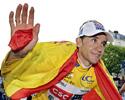
|
The sprinters and rouleurs should come back into the picture on the next three days, intermediate stages to Zaragoza (173 kilometres), Burgos (178) and Suances (180). The second rest day then takes place, with the riders once again hitting the high climbs on Saturday September 13.
The 199 kilometre race from San Vicente de la Barquera to the Alto de L'Angliru will be one of the most decisive of the race thanks to the final climb, one of the toughest in cycling. This is preceded by two category three ascents and two category one mountains, making it certain that there will be a worthy winner at the end of the stage.
Another summit finish follows on the 158 kilometre leg from Oviedo to E. E. Fuentes de Invierno, with the final two climbs being category one. Some respite then follows; stage 15 from Cudillero to Ponferrada is 198 kilometres in length and is lumpy rather than saw-toothed in nature, while the next three stages to Zamora (185 km), Valladolid (160 km) and Las Rozas (179 km) are much flatter.
The general classification is almost certain to be decided on the 19th and 20th stages. The first of these crosses two category one climbs en route to Pedro Delgado's hometown of Segovia, but the flat run in to the finish may prevent big time gaps and allow the sprinters to get back into the picture before the end. However Saturday, September 20's hill climb time trial will certainly be one for the GC men; the 16 kilometres from La Granja de San Ildefonso to the Alto de Navacerrada will settle things once and for all, giving a clear race victor prior to the final processional stage to Madrid.
For more details on the route, read the post-launch reactions.
